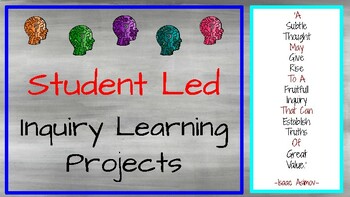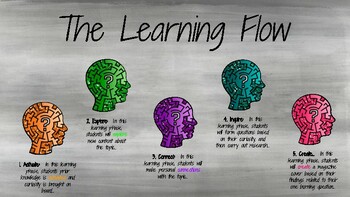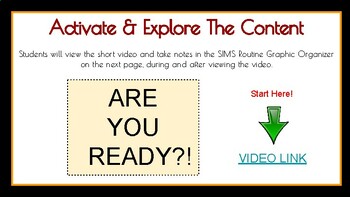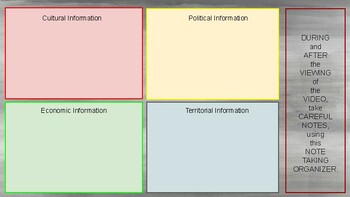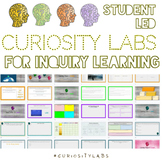Student Led Inquiry Projects: Why do People Join Cults?
- PDF
Also included in
- Why Inquiry Based Learning?With inquiry based learning, students take an active role in their learning by asking questions, analyzing data, synthesizing information, reflecting on their own thinking, communicating their ideas, collaborating with their peers, and using creative strategies to solve prPrice $9.75Original Price $14.25Save $4.50
Description
Why Inquiry Based Learning?
With inquiry based learning, students take an active role in their learning by asking questions, analyzing data, synthesizing information, reflecting on their own thinking, communicating their ideas, collaborating with their peers, and using creative strategies to solve problems. Inquiry based learning helps students think critically and gain a deeper understanding of the subjects they are studying in a way that is aligned with their intrinsic wonderment and curiosity.
Two Popular Options for Classroom Use
Option 1:
The teacher can animate and guide the students through the slides using a SmartBoard/Projector or in a Zoom room (or equivalent online learning platform). The students can engage with the slides as the teacher actively supports the students with the associated historical thinking skills.
Option 2:
The students can work on the labs individually. The pages contain clear instructions and graphic organizers to scaffold their thinking as they progress through the various stages of the history lab.
What are the advantages of inquiry based learning?
1. Encourages Critical Thinking: Inquiry-based learning encourages students to think critically and ask questions. This helps them develop problem-solving skills and encourages them to think beyond the scope of the lesson.
2. Increases Engagement: Inquiry-based learning is interactive and engaging, so students are more likely to stay focused and interested in the lesson
3. Develops Problem Solving Skills: Through inquiry-based learning, students develop their problem-solving skills, as they learn to identify issues, analyze data, and come up with solutions
4. Enhances Creativity: Inquiry-based learning encourages students to come up with unique ideas and solutions, which helps them to develop their creativity
5. Builds Self-Confidence: Inquiry-based learning helps students to become more independent thinkers, which in turn, builds their self-confidence
6. Increases Retention: Inquiry-based learning helps students to retain information better, as they are actively involved in the learning process.
What are the thinking skills associated with inquiry based learning?
1. Questioning: Asking a variety of questions that challenge existing assumptions and explore different perspectives
2. Analysis: Examining ideas and data to identify patterns, relationships and underlying meaning
3. Synthesis: Combining ideas and information from different sources to create something new
4. Reflection: Evaluating and reflecting on one’s own thinking and learning
5. Communication: Explaining ideas and opinions clearly and effectively to others
6. Collaboration: Working together with others to produce a shared understanding
7. Creativity: Generating and exploring new ideas to solve problems and meet challenges.
Upcoming Topics for 2022-2024:
1. American Revolution
2. Constitutional Convention
3. Declaration of Independence
4. Founding Fathers
5. United States Constitution
6. Shays’ Rebellion
7. Industrial Revolution
8. Louisiana Purchase
9. War of 1812
10. Missouri Compromise.
11. Monroe Doctrine.
12. Trail of Tears.
13. Andrew Jackson.
14. Nullification Crisis.
15. Texas Revolution.
16. Mexican-American War.
17. Manifest Destiny
18. Gold Rush. 19. Abolitionism.
20. Underground Railroad.
21. Women’s Rights Movement.
22. Seneca Falls Convention.
23. Dred Scott Decision.
24. Civil War.
25. Emancipation Proclamation.
26. Thirteenth Amendment
27. Battle of Gettysburg.
28. Battle of Antietam.
29. Reconstruction.
31. Fourteenth Amendment.
32. Fifteenth Amendment
33. Industrialization
34. Gilded Age
35. Homestead Act.
36. Transcontinental Railroad.
37. Indian Wars.
38. Dawes Act.
39. Spanish-American War.
40. Panama Canal.
41. Progressivism.
42. Suffrage Movement.
43. Nineteenth Amendment.
44. Triangle Shirtwaist Factory Fire.
45. World War I
46. Espionage Act.
47. Selective Service Act.
48. Great Migration
49. Harlem Renaissance.
50. Nineteenth Amendment.
51. Treaty of Versailles.
52. Red Scare. 53. Prohibition.
54. Scopes Trial.
55. Great Depression.
56. New Deal.
57. Social Security Act
58. Bonus Army
59. World War II
60. Pearl Harbor
61. Manhattan Project
62. Internment of Japanese-Americans
63. D-Day
64. Battle of Midway
65. Atomic Bomb
66. Holocaust
67. Nuremberg Trials
68. United Nations
69. GI Bill
70. Cold War
71. NATO
72. Korean War
73. McCarthyism
74. Civil Rights Movement 75. Brown v. Board of Education
76. Rosa Parks
77. Little Rock Nine
78. Freedom Riders
79. March on Washington
80. Voting Rights Act
81. Vietnam War
82. Tet Offensive
83. Watergate
84. End of the Cold War
85. Space Race
86. AIDS Crisis
87. Reganomics
88. War on Drugs
89. Gulf War
90. O.J. Simpson Trial
91. Clinton Impeachment
92. 9/11 Attacks
93. Iraq War
94. War in Afghanistan
95. Arab Spring
96. Occupy Wall Street
97. Affordable Care Act
98. DACA
99. Opioid Crisis 100. Black Lives Matter
101. Me Too Movement
102. Paris Climate Agreement
103. 2016 U.S. Presidential Election
104. Brexit
105. Trump Administration
106. Immigration Policies
107. Tax Reform
108. Supreme Court Decisions
109. Gun Control Debate
110. Net Neutrality
111. Technology Revolution
112. Social Media
113. Rise of Populism
114. Globalization
115. Trade Wars
116. Climate Change
117. Nationalism
118. Fake News
119. Media Bias
120. Rise of Artificial Intelligence
121. International Terrorism
122. Refugee Crisis
123. Religious Extremism
124. Nuclear Proliferation
125. Protectionism
126. North Korea
127. Iran Nuclear Deal
128. Immigration Reform
129. Trans-Pacific Partnership
130. Brexit Negotiations
131. Tariff War
132. Global Financial Crisis
133. Stock Market Crash
134. Trade Agreements
135. World Trade Organization
136. Digital Revolution
137. Automation
138. Social Networking
139. Data Privacy
140. Cybersecurity
141. Digital Currency
142. Internet of Things
143. Smart Homes
144. Drone Technology
145. Self-Driving Cars
146. Smartphones
147. Virtual Reality
148. Augmented Reality
149. 3D Printing
150. Genetics
151. Biotech
152. Nanotechnology
153. Renewable Energy 1
54. Environmental Protection
155. Space Exploration
156. Robotics
157. Autonomous Vehicles
158. Smart Cities
159. Block Chain
160. Internet Governance
161. Privacy Rights
162. Online Piracy
163. Intellectual Property
164. Human Rights
165. Global Health
166. Economic Inequality
167. Education Reform
168. Gender Equality
169. Labor Rights
170. Refugee Rights
171. Human Trafficking
172. Social Justice
173. Poverty
174. Hunger
175. Homelessness
176. Racism
177. Drug Abuse
178. Mental Health
179. Gun Violence
180. Animal Rights
181. Climate Change Adaptation
182. Natural Disasters
183. Ocean Pollution
184. Population Growth
185. Refugee Resettlement
186. Renewable Resources
187. Water Conservation
188. Sustainable Development
189. Nuclear Energy
190. Nuclear Waste Disposal
191. Genetic Engineering
192. Human Cloning
193. Global Warming
194. Renewable Fuel
195. Ocean Acidification
196. Renewable Energy Sources
197. Alternative Energy
198. Energy Efficiency
199. Renewable Energy Tax Incentives
200. Carbon Capture Technology
Popular History Education Websites:
1. Khan Academy https://www.khanacademy.org/
2. Smithsonian Institute https://www.si.edu/
3. History.com https://www.history.com/
4. BBC History https://www.bbc.co.uk/history
5. US History.org https://www.ushistory.org/
6. National Geographic https://www.nationalgeographic.com/
7. The History Channel https://www.history.com/
8. History World http://www.historyworld.net/
9. The British Museum https://www.britishmuseum.org/
10. History of Science Society https://hssonline.org/
11. Ancient History Encyclopedia https://www.ancient.eu/
12. World History Encyclopedia https://www.worldhistory.org/
13. History Extra http://www.historyextra.com/
14. National History Day https://nhd.org/
15. National Park Service https://www.nps.gov/
16. The History Project https://www.thehistoryproject.org/
17. The Holocaust Encyclopedia https://encyclopedia.ushmm.org/
18. Library of Congress https://www.loc.gov/
19. American Memory https://memory.loc.gov/
20. The National Archives https://www.archives.gov/
21. Museum of Modern Art https://www.moma.org/
22. The White House Historical Association https://www.whitehousehistory.org/
23. The National WWII Museum https://www.nationalww2museum.org/
24. The World War II Database http://ww2db.com/
25. World History Connected http://worldhistoryconnected.press.illinois.edu/
26. The American Revolution https://www.americanrevolution.org/
27. The History Guide https://www.historyguide.org/
28. The National WWII Memorial https://www.nps.gov/nwwm/
29. National Museum of American History https://americanhistory.si.edu/
30. The Gilder Lehrman Institute of American History https://www.gilderlehrman.org/

